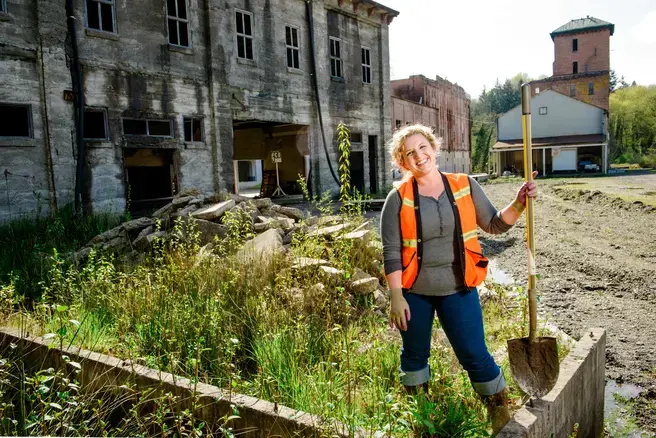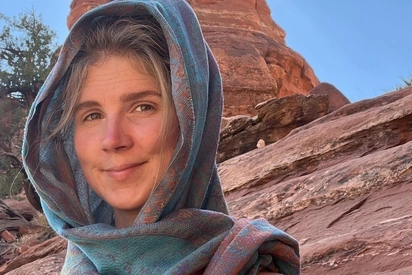
The Old Brewhouse at the former Olympia Brewery site. Sarah Amell ’03 and her staff will provide a cultural resource assessment of the site complex to support future development proposed by the owner.
Archaeologist Sarah Amell ’03 has completed field survey work at Australia’s notorious Port Arthur penal colony and excavated an ancient fishing and shellfish-gathering camp on Mud Bay, shipwrecks off the coast of Tasmania, and nearly 80 miles of land skirting Interstate 5—much of it through Puyallup Tribe of Indians' land—before it’s widened to add HOV lanes.
These feats represent a sample of the work that the scuba-diving archaeologist has done since starting her journey nearly 15 years ago to document and preserve the buried and submerged cultural heritage of the Pacific Northwest.
The mother of a toddler, Amell was working for the Washington State Department of Transportation (WSDOT) on the I-5 HOV program when she decided to start her own business. So in 2011, when her son was an infant, she launched Aqua Terra Cultural Resource Consultants (ATCRC), a Tumwater-based firm that provides cultural resource assessment services for prehistoric and historic cultural resource sites throughout the region. For the first year-and-a-half, she said, “I did it alone because I wasn’t in a place where I could afford to bring on employees.”
“Contract by contract,” she built up the company, a certified Women’s Business Enterprise as well as a Disadvantaged Business Enterprise (based on its size). It now has six staff members, including another Greener, Jennifer Chambers ’05, ATCRC’s senior archaeologist.
As ATCRC’s principal investigator and project manager, Amell has on-the-ground and under-the-sea experience working in extreme elements, as well as direct knowledge of not only the environment and history of the area, but also the requirements of identifying and protecting culturally important resources on lands being developed.
Because she’s running a business now, she’s doing less of the field survey work and more of what it takes to keep up the business— accounting, writing reports and agreements, and meeting with clients and agencies. But that’s fine with her. “I love the variety of where I am now with the firm,” she said. “I’m not doing as much fieldwork. That often gets delegated, but if I decide I need a break from being in the office, I can always get outside.”
Amell’s enthusiasm for archaeology was sparked at South Puget Sound Community College, where for two summers she worked on a dig at the Mud Bay property of former Secretary of State Ralph Munro and his wife Karen. Students in the community college’s field school unearthed thousands of artifacts there. Among the discoveries made during the multi-year project were shell middens, basketry, a large cedar-bark gill net, stone tools and the remnants of a 500-year-old fish trap.
Due to this remarkable experience, Amell—who served as the site’s lab director and site manager in 2002—knew she wanted to become an archaeologist. That meant getting her master’s degree, a minimum requirement for meeting the Secretary of the Interior's Professional Qualifications Standards.
Evergreen was her springboard to graduate school. As a transfer student, she concentrated on Native Studies, and through independent contracts, on wet-site and underwater archaeology.
“I got a lot more focused there,” said the South Sound native, adding that in exploring her interest in Northwest Coast Native culture, “It was great to learn more about the history of the development of the area.”
After receiving her B.A. from Evergreen, Amell relocated to Australia to study at James Cook University in Queensland and Flinders University in Adelaide. Flinders, she said, “ran us through an extensive underwater archaeology boot camp involving all the different methods for survey and excavation.” She completed the training and was awarded her Master of Maritime Archaeology degree in 2006.
A member of the national Register of Professional Archaeologists (RPA), Amell has advanced certifications in open-water diving and navigation. Before launching her firm, she worked for for a Seattle-based environmental consulting firm where she spent time conducting archaeological surveys throughout Washington, Oregon, and Wyoming.
Her next stop was with WSDOT, where she served as the principal archaeologist assigned to the $1.6-billion Tacoma/ Pierce County HOV construction projects. She also served as the cultural resources liaison for WSDOT and the U.S. Army Corps of Engineers.
At ATCRC, she and her team assist clients in complying with state and federal laws mandating the stewardship of significant historic, archaeological, and traditional cultural sites to protect them from damage or loss during development. They work with private property owners, local agencies, federal agencies, and tribes.
“I really love working with our clients,” Amell said. “Oftentimes, when we get called, our clients are unaware or fearful of the process. They’re worried that we’ll find a site and the project will be shut down. What makes me happiest is sharing the process with them so there’s nothing to fear. I let them know that if we find something, we’ll assist them as they work with the appropriate entities to manage it, and that protecting our shared history and resources is a positive thing, now and for our future generations.”
Aqua Terra CRC is currently working on numerous projects throughout the region and plans to expand its services and locations. “We live in a very good place to do archaeology,” said Amell. “The Puget Sound is chock-full of cultural resource sites needing to be preserved and managed. I absolutely love what I do and am fortunate to work with such an amazing team.”



